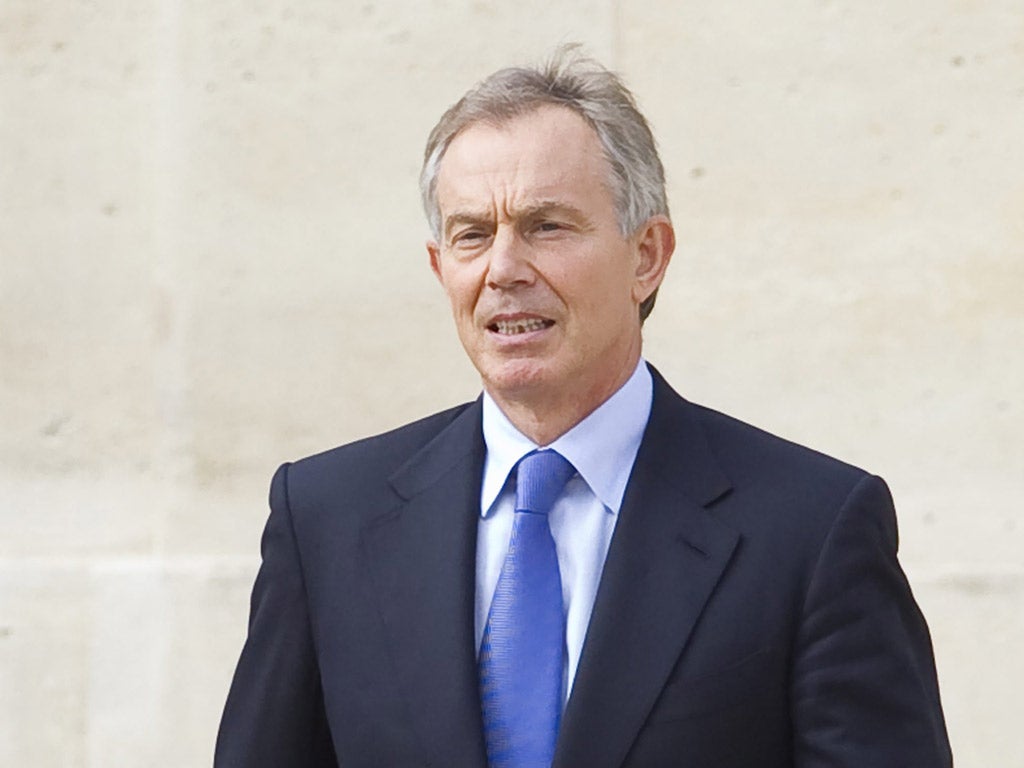Who does Tony Blair think he is?
A co-ordinated media blitz meant the ex-PM was inescapable this past week. Jane Merrick wonders just what his game is

"Gizza job. I can do that." Tony Blair hasn't quite used the words of Alan Bleasdale's Scouse hero Yosser Hughes but, in the past week, with a series of high-profile interviews and TV appearances, he's come close.
The former prime minister, after five years away from the British political front line, is back to give us his wisdom on the economy, Europe, the Middle East and the Labour Party. He wants to be prime minister again, but knows he can't be, so is casting around for another "big job". Apparently unperturbed by fresh revelations in this paper last week about his suppression of dissent over his decision to take the country into war in Iraq, Mr Blair thinks the international community holds him in enough respect to allow him to take one of the biggest jobs in the world.
But what's wrong with his current work? As envoy to the Middle East on behalf of the Quartet of the UN, EU, Russia and the US, he's been busy during the past five years, his office insists. A list of his achievements includes facilitating a sewage treatment farm in Gaza, successfully lobbying the Israeli government to allow Palestinian farmers to export carnations and strawberries, and securing frequencies for a second mobile phone operator, Wataniya, to operate in the West Bank. But, while all of this may have made a difference to the everyday lives of Palestinians, they hardly merit a Nobel Peace Prize.
What is more, the Palestinian economy is suffering a downturn – growth is down and unemployment is soaring. Worse still, Mr Blair and his Quartet Representative office were last year forced to give up their suite at the luxury American Colony hotel in east Jerusalem because of high costs, and have since relocated to an unglamorous concrete office block down the road. None of this can suit the open-necked, sun-tanned Mr Blair.
There are other pages in his portfolio: earning £2.5m a year from the Wall Street investment bank JP Morgan; his own global consultancy, Tony Blair Associates, which he intends to expand; his faith foundation; and commanding nearly £200,000 a time for a speech. Yet all of this is largely to private audiences. The former prime minister clearly craves his public.
So, with the help of his newly expanded PR team, Mr Blair began his second coming with an interview on the BBC's political flagship Andrew Marr Show – which was somewhat overshadowed by the IoS revelations about him blocking his cabinet over Iraq legal advice. He then guest edited the London Evening Standard on Wednesday, before a chat with the friendly Financial Times yesterday.
In his FT interview, Mr Blair said "I don't know exactly" what his route back would be, but said he was ready for a major public international role: "I feel I've got something to say. If people want to listen, that's great, and if they don't, that's their choice … I would want to emphasise how fast the world around us is changing and how incredibly dangerous it is for us to think we can stand still."
Three years ago, Mr Blair failed to secure the position of first full-time EU president, partly because he didn't lobby hard enough, but also because key European players did not want a British former prime minister so closely associated with the Iraq war.
However The IoS understands that one job Mr Blair may be offered is director general of the World Trade Organisation, a post that comes up next year. The current holder, Pascal Lamy, is French and has served two four-year terms, and diplomatic sources have hinted that a British candidate would be in a good position to get the job. Even David Cameron is understood not to be opposed to Mr Blair's possible candidature.
In his interview yesterday, Mr Blair said he would have taken a similar role at the World Bank, as well as the EU job, had they been offered.
His annual income is said to be around £20m, which is absorbed into a secretive limited liability structure. Mr Blair insists he pays 50 per cent income tax and is a UK taxpayer.
But there remain concerns about his suitability for an international job given the overlapping of interests between his political work in the Middle East, his consultancy and his advice for JP Morgan. The investment bank's clients include QTel, the Qatari phone company that owns a controlling stake in Wataniya, the mobile company Mr Blair helped in the West Bank, and British Gas Group, which had an interest in the Gaza Marine gas development that he is also helping to promote. Mr Blair's consultancy has also received money from Kazakhstan.
Mr Blair said yesterday that he had never raised the work of British Gas Group with JP Morgan and that allegations of a conflict of interest were "ridiculous".
Despite his huge income, and the shadowy way he hides it away, Mr Blair said: "I am never going to be part of the super-rich. The purpose of this is not to make money, it's to make a difference."
But will he ever get the chance? One friend says that Mr Blair "feels like an alien in his own country – he feels despised". And perhaps that is where the answer lies.
Join our commenting forum
Join thought-provoking conversations, follow other Independent readers and see their replies
Comments
Bookmark popover
Removed from bookmarks